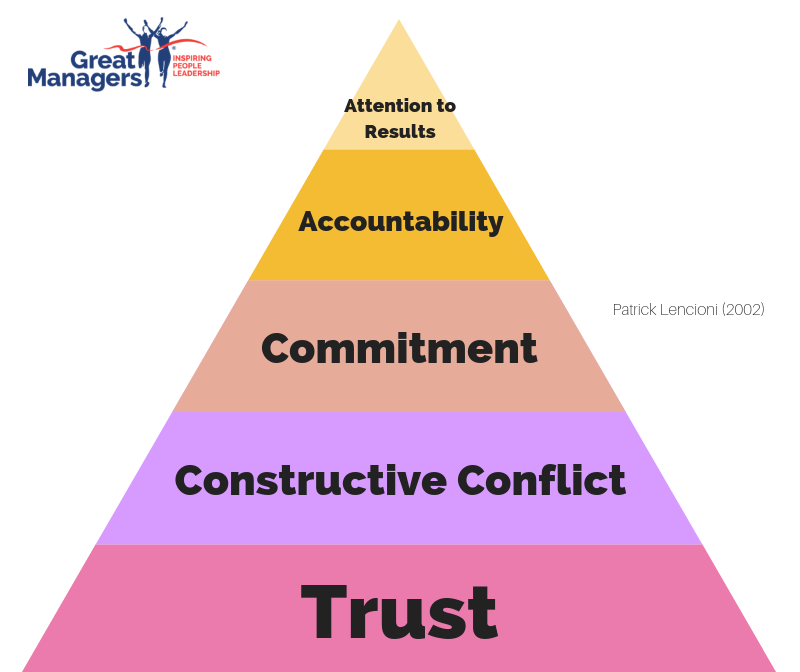5 Ways to Develop a High Performing Team
High-Performing Teams are not formed overnight, nor are they achieved in a seminar or weekend retreat.
Teams that are pieced together with little planning, few resources, and little support are going to be high-maintenance rather than high-performing and will not result in any organisational advantage.
Dysfunctional teams drain time, money and energy away from you, and your organisation.
In the above extract from a recent Great Managers MasterClass we look at:
- The benefits of a High Performing Team
- Problems that arise if Teams are Dysfunctional
- Patrick Lencioni’s Model (5 Ways to Develop a High Performing Team)
If you would like to view the full-length lesson on How to Build a High Performing Team, for a limited time you can subscribe to the Great Managers MasterClass for free. *Click here for more info.*
[Don’t like videos? Video Transcription Below!]
5 Ways to Develop a High Performing Team – An Introduction to the Lencioni Model
The benefits of a high performing team, (what’s in it for you).
We get engaged employees in a high performing team.
They tend to be more productive and more committed.
The other thing you’ll see is that there’s more effective decision-making. Decisions come a bit easier sometimes, and there’s not a lot of resistance around the decision-making process.
People have input and there’s more flow with them.
We tend to see better customer service and also stakeholder relationships.
Any conflict is constructive, not destructive, (there is a big difference).
There tend to be higher levels of job satisfaction, and higher levels of growth. (That could be organisational growth, or it can be personal growth).
The good thing is there’s less effort for managers in a high performing team.
One of our Great Managers Mantras is about valuing your energy like the precious resource that it is. That’s where it starts to pay off… when the team’s working really well.
Obviously, there are better overall results in a high performing team too.
 Problems with a Dysfunctional Team
Problems with a Dysfunctional Team
Now, the flip side of that, if teams are dysfunctional, they cost you big time.
In terms of your own time, the organisation’s time, quality of outcomes, the results, money, and most importantly, your energy.
Dysfunctional teams can sap the life out of you and others.
Now, it’s important to know that if a team is dysfunctional, everyone knows it.
People within the team know, “This isn’t working well.”
Particularly people outside your team looking in know that the team’s dysfunctional.
Guess what? They actually hold the leader responsible.
That’s why it’s really important that you know how to deliberately and skillfully build a high performing team.
An Introduction to Patrick Lencioni’s Model (5 Ways to Develop a High Performing Team)
Let’s have a look now at Patrick Lencioni’s Model. It’s very practical for helping teams improve and become not just functional, but high performing.
I’ve adapted this model from the book, “The Five Dysfunctions of a Team.”
His wording is a little bit different than we use. I have used this model running workshops hundreds of times and it really does work!
I’ve worked with teams over a longer period of time and seen the transition out of dysfunctional into high performing.
Have a look at the model. It’s got five levels, and each level is dependent on the level below it.
The top level is attention to results.
To get results, you need accountability.
You can’t get accountability without commitment, (which is similar to engagement).
You can’t get commitment without having constructive conflict, or what we call robust discussion and then that is based on trust.
Now, what I’ve noticed over the years is that when teams aren’t getting results, their attention goes onto their results. (Their KPIs, targets etc).
They rarely explore the lower levels, and this is where Lencioni’s work is quite practical.
Lencioni says that teamwork ultimately comes down to practising a small set of principles over a longer period of time.
Success is not a matter of mastering sophisticated theory, but rather embracing common sense with uncommon levels of discipline and persistence.
It’s about understanding human beings, and the way that we work best.
Next Steps
If you would like to view the full-length lesson on How to Build a High Performing Team, for a limited time you can subscribe to our MasterClass for free. Click here for more info.








